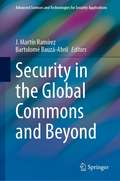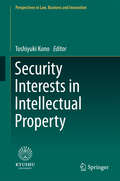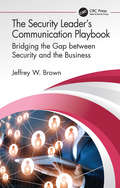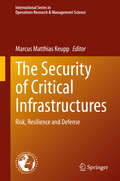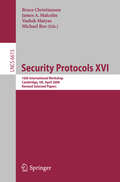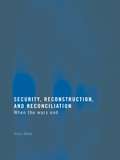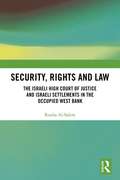- Table View
- List View
Security in Computer and Information Sciences: Second International Symposium, EuroCybersec 2021, Nice, France, October 25–26, 2021, Revised Selected Papers (Communications in Computer and Information Science #1596)
by Erol Gelenbe Marija Jankovic Dionysios Kehagias Anna Marton Andras VilmosThis open access book constitutes the thoroughly refereed proceedings of the Second International Symposium on Computer and Information Sciences, EuroCybersec 2021, held in Nice, France, in October 2021.The 9 papers presented together with 1 invited paper were carefully reviewed and selected from 21 submissions. The papers focus on topics of security of distributed interconnected systems, software systems, Internet of Things, health informatics systems, energy systems, digital cities, digital economy, mobile networks, and the underlying physical and network infrastructures.This is an open access book.
Security in the 21st Century: The United Nations, Afghanistan and Iraq
by Alex ConteThis exceptional volume examines international security issues by way of case studies of the conflicts in Afghanistan and Iraq. Each of these raises significant issues concerning the use of force between states and the role of the United Nations in maintaining international peace and security. Alex Conte examines international terrorism and the intervention in Afghanistan, including the controversial policy of pre-emptive strikes in the war on terror, and discusses the role adopted by the United Nations in the political and economic reconstruction of states subjected to conflict. Analyzing events in Iraq since 1990, he assesses the legality of the current war and leads to an examination of the role of the UN in maintaining peace and security and possible options for reform and accountability. The study will be a valuable guide for all those keen to understand the use of international law and the United Nations in the first two major conflicts of the 21st century and their implications for the future role of the United Nations.
Security in the 21st Century: The United Nations, Afghanistan and Iraq
by Alex ConteThis exceptional volume examines international security issues by way of case studies of the conflicts in Afghanistan and Iraq. Each of these raises significant issues concerning the use of force between states and the role of the United Nations in maintaining international peace and security. Alex Conte examines international terrorism and the intervention in Afghanistan, including the controversial policy of pre-emptive strikes in the war on terror, and discusses the role adopted by the United Nations in the political and economic reconstruction of states subjected to conflict. Analyzing events in Iraq since 1990, he assesses the legality of the current war and leads to an examination of the role of the UN in maintaining peace and security and possible options for reform and accountability. The study will be a valuable guide for all those keen to understand the use of international law and the United Nations in the first two major conflicts of the 21st century and their implications for the future role of the United Nations.
Security in the Global Commons and Beyond (Advanced Sciences and Technologies for Security Applications)
by J. Martín Ramírez Bartolomé Bauzá-AbrilThis book deals with two areas: Global Commons and Security: inextricably melted together and more relevant than ever in a world which is ever globalized and… with an incognita looming on the horizon: the effects of the Coronavirus pandemic upon the International Relations and globalization. Global Commons have always been relevant. It was Mahan who argued that the first and most obvious light in which the sea presents itself from the political and social point of view, is that of a great highway; or better, perhaps, of a wide common… Nowadays, this view has been further developed and, in addition to the unique legal implications that the Global Commons introduce, they are viewed, more and more intently, as a common pool of resources. Or perhaps, not that common… Resources, the key word! Which has to be always supplemented by two key words: access and security. And still, another one: data, the cyberspace contribution to the equation.
Security Interests in Intellectual Property (Perspectives in Law, Business and Innovation)
by Toshiyuki KonoEconomic development increasingly depends to a large extent on innovation. Innovation is generally covered by intellectual property (IP) rights and usually requires extensive funding. This book focuses on IP and debt financing as a tool to meet this demand. This book clarifies the situation of the use of IP as collateral in practice through a survey conducted in Japan on IP and debt financing. Various obstacles in the proper use IP and debt financing are identified, and some projects to facilitate its use are illustrated. IP and debt on a global scale, either by attracting foreign lenders or by collateralizing foreign IP rights, needs appropriate private international laws. This book analyzes such regulations in which the United Nations Commission on International Trade Law (UNCITRAL) has worked, paying due attention to the law of finance and insolvency law, as well as IP laws. However, further analysis is needed to identify under what conditions such solutions would show optimal effects. This book offers comprehensive analysis from an economic point of view.
Security Interests under the Cape Town Convention on International Interests in Mobile Equipment
by Sanam SaidovaThis book provides an extensive analytical examination of the Cape Town Convention and its Protocols. The Convention aims to facilitate asset-based financing and leasing of aircraft, railway and space objects by establishing a uniform legal regime for the creation and protection of security and related interests in these types of equipment. The book provides a detailed treatment of issues arising from the creation of security and other international interests under the Convention, from the need to ensure their priority among competing interests to the enforcement of remedies in the case of the debtor's default or insolvency. Security interests in aircraft, railway and space objects are among the most frequently invoked mechanisms used to ensure repayment of the debt. It is their significance, effectiveness and frequency of use that explains this work's focus and scope.
Security Interests under the Cape Town Convention on International Interests in Mobile Equipment
by Sanam SaidovaThis book provides an extensive analytical examination of the Cape Town Convention and its Protocols. The Convention aims to facilitate asset-based financing and leasing of aircraft, railway and space objects by establishing a uniform legal regime for the creation and protection of security and related interests in these types of equipment. The book provides a detailed treatment of issues arising from the creation of security and other international interests under the Convention, from the need to ensure their priority among competing interests to the enforcement of remedies in the case of the debtor's default or insolvency. Security interests in aircraft, railway and space objects are among the most frequently invoked mechanisms used to ensure repayment of the debt. It is their significance, effectiveness and frequency of use that explains this work's focus and scope.
The Security Leader’s Communication Playbook: Bridging the Gap between Security and the Business (Internal Audit And It Audit Ser.)
by Jeffrey W. BrownThis book is for cybersecurity leaders across all industries and organizations. It is intended to bridge the gap between the data center and the board room. This book examines the multitude of communication challenges that CISOs are faced with every day and provides practical tools to identify your audience, tailor your message and master the art of communicating. Poor communication is one of the top reasons that CISOs fail in their roles. By taking the step to work on your communication and soft skills (the two go hand-in-hand), you will hopefully never join their ranks. This is not a “communication theory” book. It provides just enough practical skills and techniques for security leaders to get the job done. Learn fundamental communication skills and how to apply them to day-to-day challenges like communicating with your peers, your team, business leaders and the board of directors. Learn how to produce meaningful metrics and communicate before, during and after an incident. Regardless of your role in Tech, you will find something of value somewhere along the way in this book.
The Security Leader’s Communication Playbook: Bridging the Gap between Security and the Business (Internal Audit And It Audit Ser.)
by Jeffrey W. BrownThis book is for cybersecurity leaders across all industries and organizations. It is intended to bridge the gap between the data center and the board room. This book examines the multitude of communication challenges that CISOs are faced with every day and provides practical tools to identify your audience, tailor your message and master the art of communicating. Poor communication is one of the top reasons that CISOs fail in their roles. By taking the step to work on your communication and soft skills (the two go hand-in-hand), you will hopefully never join their ranks. This is not a “communication theory” book. It provides just enough practical skills and techniques for security leaders to get the job done. Learn fundamental communication skills and how to apply them to day-to-day challenges like communicating with your peers, your team, business leaders and the board of directors. Learn how to produce meaningful metrics and communicate before, during and after an incident. Regardless of your role in Tech, you will find something of value somewhere along the way in this book.
Security Litigation: Best Practices for Managing and Preventing Security-Related Lawsuits
by Eddie SorrellsSecurity Litigation: Best Practices for Managing and Preventing Security-Related Lawsuits provides practical guidance and examples on how to deal with the most difficult legal issues that security executives face every day, also exploring the key issues that occur before, during, and after a lawsuit. The book demonstrates scenarios that have actually played out in courtrooms, depositions, and contractual negotiations, and provides answers to challenging security litigation questions such as, What does this contractual provision mean if we get sued? Am I in legal trouble if I assign unarmed vs. armed officers and a crime occurs? How do I defend my company without blaming my customer? Increasingly, issues such as security surveys, contractual indemnification, and even marketing language are at the center of lawsuits concerning security practices. Many organizations face security-related lawsuits on an increasing basis, and this book provides a much needed resource to help security professionals successfully navigate the unique nature of security-related lawsuits. Accessibly written for those without a law background, the book assists readers through education, awareness, sample contract language, and assessment templates, offering meaningful recommendations and solutions. - Presents practical guidelines for security professionals involved in the prevention of security-related lawsuits - Demonstrates how to address real world problems not always found in case law or rules of evidence - Provides a much needed resource to help security professionals successfully navigate the unique nature of security-related lawsuits - Offers learning aids such as sample documents and graphs that illustarte common liability issues, along with documents from actual cases
Security Management for Occupational Safety
by Michael LandHow far would or should you go to feel secure? While everyone wants safety and security, the measures to achieve it are often viewed of as intrusive, unwanted, a hassle, and limiting to personal and professional freedoms. Yet, when an incident occurs, we can never have enough security. Security Management for Occupational Safety provides a framewor
Security Manager's Guide to Disasters: Managing Through Emergencies, Violence, and Other Workplace Threats
by Anthony D. ManleyTerrorist or criminal attack, fire emergency, civil or geographic disruption, or major electrical failure recent years have witnessed an increase in the number of natural disasters and man-made events that have threatened the livelihoods of businesses and organizations worldwide. Security Manager‘s Guide to Disasters: Managing Through Emergencies,
The Security of Critical Infrastructures: Risk, Resilience and Defense (International Series in Operations Research & Management Science #288)
by Marcus Matthias KeuppThis book analyzes the security of critical infrastructures such as road, rail, water, health, and electricity networks that are vital for a nation’s society and economy, and assesses the resilience of these networks to intentional attacks. The book combines the analytical capabilities of experts in operations research and management, economics, risk analysis, and defense management, and presents graph theoretical analysis, advanced statistics, and applied modeling methods. In many chapters, the authors provide reproducible code that is available from the publisher’s website. Lastly, the book identifies and discusses implications for risk assessment, policy, and insurability. The insights it offers are globally applicable, and not limited to particular locations, countries or contexts. Researchers, intelligence analysts, homeland security staff, and professionals who operate critical infrastructures will greatly benefit from the methods, models and findings presented. While each of the twelve chapters is self-contained, taken together they provide a sound basis for informed decision-making and more effective operations, policy, and defense.
Security of Natural Gas Supply through Transit Countries (Nato Science Series II: #149)
by Jens Hetland Teimuraz GochitashviliJens HETLAND & Teimuraz GOCHITASHVILI In contrast to oil, natural gas is usually routed through pipeline systems stretched from the wellhead to the end-user – although liquefied natural gas (LNG) is gaining increased interest; the commercialisation of natural gas fields is inherently linked to rigid transportation systems that require huge investments in tangible assets fixed to specific locations; the supply of natural gas is constrained by the transportation system, and requires access to appropriate infrastructure for transport and distribution; the trading of natural gas is traditionally associated with long-term contracts, albeit the duration per se of gas transport contracts appears to be less important after the deregulation of the energy markets. As diversification is strategically important to modern societies, the security of energy supplies becomes an inherent issue. In order to avoid situations of shortage, and to keep the price level stable, industrial nations are paying attention to the security of energy supplies. In brief terms this means that having more than one supplier of natural gas and more than one transport route would be strategically important. This also affects political issues and international law and regulations, economics, science and technology. The purpose of this book is to address opportunities extended from science and research pertaining to the exploitation and international trading of natural gas that involves transit countries. This especially relates to the transport and handling of gas from remote regions and pipelines that are
Security Officers and Policing: Powers, Culture and Control in the Governance of Private Space
by Mark ButtonThis volume examines how and to what extent security officers make use of`legal tools. The work identifies these tools and draws on two case-study sites to illustrate how security officers make use of them as well as how they fit in broader security systems to secure compliance. The study also examines the occupational culture of security officers and links them into the broader systems of security that operate to police nodes of governance. The book provides insights for researchers and policy-makers seeking to develop policy for the expanding private security industry.
Security Officers and Policing: Powers, Culture and Control in the Governance of Private Space
by Mark ButtonThis volume examines how and to what extent security officers make use of`legal tools. The work identifies these tools and draws on two case-study sites to illustrate how security officers make use of them as well as how they fit in broader security systems to secure compliance. The study also examines the occupational culture of security officers and links them into the broader systems of security that operate to police nodes of governance. The book provides insights for researchers and policy-makers seeking to develop policy for the expanding private security industry.
Security Officers and Supervisors: 150 Things You Should Know
by Lawrence J. Fennelly Marianna A. PerrySecurity Officers and Supervisors: 150 Things You Should Know presents an array of relevant topics, including addressing “Tips of the Trade” in how to manage a team of professionals and serve as an effective supervisor. This includes both keeping management informed of decisions, aligning policy, procedure, and training with business objectives, and hiring and managing a team of professionals to maintain continuity of operations and a safe, secure environment. There are many factors involved in managing a department and workforce and the book uses a handy-reference format to present the salient information, both concrete knowledge as well as the softer skills, required for managers to motivate individuals and lead teams to pull in the same direction.Short, easy-to-read chapters include lists of relevant definitions, some do’s and don’ts, best practices, emerging trends, and well as example case studies based upon the authors’ professional experience. The primary goal is to provide a foundation for readers to identify, comprehend, and apply management concepts and security principles in their own environments so that readers will be readily prepared to troubleshoot problems and overcome challenges.Building and leading a trusted team that can set and achieve clearly outlined objectives begins with leadership. Security Officers and Supervisors: 150 Things You Should Know outlines those principles and traits required for professionals to succeed when promoted (though, more often than not, thrust!) into a security supervisory role.
Security Officers and Supervisors: 150 Things You Should Know
by Lawrence J. Fennelly Marianna A. PerrySecurity Officers and Supervisors: 150 Things You Should Know presents an array of relevant topics, including addressing “Tips of the Trade” in how to manage a team of professionals and serve as an effective supervisor. This includes both keeping management informed of decisions, aligning policy, procedure, and training with business objectives, and hiring and managing a team of professionals to maintain continuity of operations and a safe, secure environment. There are many factors involved in managing a department and workforce and the book uses a handy-reference format to present the salient information, both concrete knowledge as well as the softer skills, required for managers to motivate individuals and lead teams to pull in the same direction.Short, easy-to-read chapters include lists of relevant definitions, some do’s and don’ts, best practices, emerging trends, and well as example case studies based upon the authors’ professional experience. The primary goal is to provide a foundation for readers to identify, comprehend, and apply management concepts and security principles in their own environments so that readers will be readily prepared to troubleshoot problems and overcome challenges.Building and leading a trusted team that can set and achieve clearly outlined objectives begins with leadership. Security Officers and Supervisors: 150 Things You Should Know outlines those principles and traits required for professionals to succeed when promoted (though, more often than not, thrust!) into a security supervisory role.
Security, Privacy and Trust in the IoT Environment
by Zaigham MahmoodThe Internet of Things (IoT) is a network of devices and smart things that provides a pervasive environment in which people can interact with both the cyber and physical worlds. As the number and variety of connected objects continue to grow and the devices themselves become smarter, users’ expectations in terms of adaptive and self-governing digital environments are also on the rise. Although, this connectivity and the resultant smarter living is highly attractive to general public and profitable for the industry, there are also inherent concerns. The most challenging of these refer to the privacy and security of data, user trust of the digital systems, and relevant authentication mechanisms. These aspects call for novel network architectures and middleware platforms based on new communication technologies; as well as the adoption of novel context-aware management approaches and more efficient tools and devices.In this context, this book explores central issues of privacy, security and trust with regard to the IoT environments, as well as technical solutions to help address them. The main topics covered include:• Basic concepts, principles and related technologies• Security/privacy of data, and trust issues• Mechanisms for security, privacy, trust and authentication• Success indicators, performance metrics and future directions.This reference text is aimed at supporting a number of potential audiences, including• Network Specialists, Hardware Engineers and Security Experts • Students, Researchers, Academics and Practitioners.
Security Protocols XVI: 16th International Workshop, Cambridge, UK, April 16-18, 2008. Revised Selected Papers (Lecture Notes in Computer Science #6615)
by James Malcolm Vashek Matyas Michael Roe Bruce ChristiansonThis book constitutes the thoroughly refereed post-proceedings of the 16th International Workshop on Security Protocols, SP 2008, held in Cambridge, UK, in April 2008. The 17 revised full papers presented together with edited transcriptions of some of the discussions following the presentations have gone through multiple rounds of reviewing, revision, and selection. The theme of this workshop was “Remodelling the Attacker” with the intention to tell the students at the start of a security course that it is very important to model the attacker, but like most advice to the young, this is an oversimplification. Shouldn’t the attacker’s capability be an output of the design process as well as an input? The papers and discussions in this volume examine the theme from the standpoint of various different applications and adversaries.
Security Protocols XVII: 17th International Workshop, Cambridge, UK, April 1-3, 2009. Revised Selected Papers (Lecture Notes in Computer Science #7028)
by Bruce Christianson James A. Malcolm Vashek Matyás Michael RoeThis book constitutes the thoroughly refereed post-proceedings of the 17th International Workshop on Security Protocols, SP 2009, held in Cambridge, UK, in April 2009. The 17 revised full papers presented together with edited transcriptions of some of the discussions following the presentations have gone through multiple rounds of reviewing, revision, and selection. The theme of this workshop was "Brief Encounters". In the old days, security protocols were typically run first as preliminaries to, and later to maintain, relatively stable continuing relationships between relatively unchanging individual entities. Pervasive computing, e-bay and second life have shifted the ground: we now frequently desire a secure commitment to a particular community of entities, but relatively transient relationships with individual members of it, and we are often more interested in validating attributes than identity. The papers and discussions in this volume examine the theme from the standpoint of various different applications and adversaries.
Security Protocols XXV: 25th International Workshop, Cambridge, UK, March 20–22, 2017, Revised Selected Papers (Lecture Notes in Computer Science #10476)
by Frank Stajano Jonathan Anderson Bruce Christianson Vashek MatyášThis book constitutes the thoroughly refereed post-workshop proceedings of the 25th International Workshop on Security Protocols, held in Cambridge, UK, in March 2017. The volume consists of 16 thoroughly revised invited papers presented together with the respective transcripts of discussions. The theme of this year's workshop was multi-objective security and the topics covered included security and privacy, formal methods and theory of security, systems security, network security, software and application security, human and societal aspects of security and privacy, security protocols, web protocol security, and mobile and wireless security.
Security, Reconstruction, and Reconciliation: When the Wars End
by Muna NduloThis key text brings together a team of leading contributors to address the complex issues of security reconciliation and reconstruction in post conflict societies. Security, Reconstruction and Reconciliation is organized into four main sections: the social, political, and economic dimensions of conflict the impact of conflict on women and children reconstruction and past human rights violations disarmament, demobilization, reintegration, post-war reconstruction and the building of a capable state and the role of the international community in the peace process. The chapters offer a detailed and succinct exposition of the challenges facing post conflict societies by articulating the vision of a new society. With a foreword by Francis Deng, the UN Secretary General’s Special Representative on Internally Displaced Persons, the authors discuss the issues in the context of possible solutions and lessons learnt in the field. This new book is a valuable resource for researchers, policy makers and students in the fields of conflict resolution, security studies, law and development.
Security, Reconstruction, and Reconciliation: When the Wars End
by Muna NduloThis key text brings together a team of leading contributors to address the complex issues of security reconciliation and reconstruction in post conflict societies. Security, Reconstruction and Reconciliation is organized into four main sections: the social, political, and economic dimensions of conflict the impact of conflict on women and children reconstruction and past human rights violations disarmament, demobilization, reintegration, post-war reconstruction and the building of a capable state and the role of the international community in the peace process. The chapters offer a detailed and succinct exposition of the challenges facing post conflict societies by articulating the vision of a new society. With a foreword by Francis Deng, the UN Secretary General’s Special Representative on Internally Displaced Persons, the authors discuss the issues in the context of possible solutions and lessons learnt in the field. This new book is a valuable resource for researchers, policy makers and students in the fields of conflict resolution, security studies, law and development.
Security, Rights and Law: The Israeli High Court of Justice and Israeli Settlements in the Occupied West Bank (Comparative Constitutionalism in Muslim Majority States)
by Rouba Al-SalemWinner of the 2019 Francis Lieber Prize Recognizing an Exceptional Published Book in the Field of the Law of Armed Conflict This book examines how the Israeli High Court of Justice (HCJ) has interpreted and applied international law principles in adjudicating petitions filed by Palestinians. The research focuses on HCJ judgments that have been rendered since the outbreak of the Second Intifada (2000) in relation to petitions challenging the legality of measures implemented by various Israeli governments and military authorities for the professed need of enhancing the security of Israeli settlements and settlers in the occupied West Bank. It discusses to what extent the HCJ provides a venue for an effective domestic remedy for alleged violations of the Palestinians’ internationally protected rights. It further analyses the judgments of the Court seeking to demonstrate why it appears to show a preference for invoking principles of Israeli administrative and constitutional law, thereby promoting the domestic rather than international Rule of Law. Although the jurisprudence of the HCJ has often been hailed as that of an ‘activist’ court, the analysis of petitions adjudicated by the Court between 2000 and 2014 illustrates why its approach is ill-suited to a situation of prolonged military occupation. Finally, the book evaluates what impact the Court’s adjudication, reasoning and interpretation has on the normative coherence of the international law of belligerent occupation.


